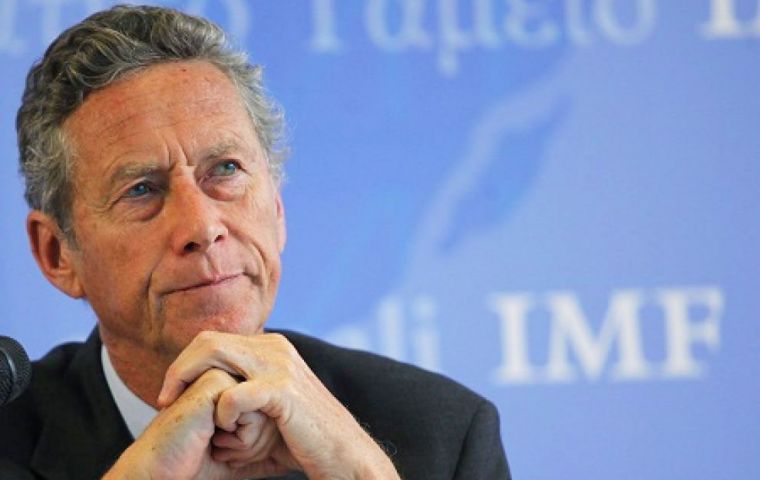MercoPress. South Atlantic News Agency
IMF warns about 'default' costs for Argentina; calls for debt restructuring mechanisms
 “If Argentina goes into default and doesn't pay the holdouts, for some time it will be unable to access markets” said Olivier Blanchard
“If Argentina goes into default and doesn't pay the holdouts, for some time it will be unable to access markets” said Olivier Blanchard The IMF's chief economist warned that a default by Argentina in its battle with holders of its defaulted debt may hurt its economy and the global financial system. Argentina continues to face the fallout of its 2001 debt default, which plunged the country into an economic crisis it is still battling to overcome.
“If it goes into default and doesn't pay the holdouts, there might be substantial costs, being basically unable to access markets for some time,” said Olivier Blanchard, head of the IMF's team of economists.
Blanchard, speaking at a news conference on the latest IMF growth forecasts for the global economy, also emphasized that “there's a cost to the world in the sense that we need resolution systems which work well when countries are in trouble.”
Under a US court order, Argentina has until next Wednesday to either pay certain hedge funds demanding full payment on defaulted bonds or risk being declared in default.
Blanchard said the Argentina case means “there's much more uncertainty as to how we'll be able to restructure debt for others countries in the future.
”So this really tells us that we need to work on improving resolution mechanisms.“
The IMF proposed an international debt restructuring mechanism in 2003 but the plan was abandoned under pressure from the United States, the institution's largest stakeholder, and the major emerging-market economies.
Argentina persuaded 92% of its creditors to accept write-offs of up to 70%, but is now facing a Catch-22: under the US judge's ruling, it cannot pay its other creditors without also paying the hedge funds; and under the restructuring deal, it is supposed to pay all its creditors the same.
If Argentina pays the so-called ”holdout“ hedge funds -- which it calls ”vulture” funds -- 100% of the 1.3 billion it owes them, it could be forced to pay all remaining creditors in full, as well.




Top Comments
Disclaimer & comment rules-

-

-

Read all comments“ Restructure debt” Does that mean that I can borrow £ 1000 from lets say Barclays Bank and then say I want to “restructure my debt”? I think I know the answer to that. Why have we to even think that countries want to “restruture” surely they ( countries ) would want to repay their debt, or I missing something.Incidently I currently have a loan from a bank and religiously make payments every month but then the bank can TRUST me.
Jul 26th, 2014 - 07:16 am 0What is it with the IMF? How many other countries are likely to be as crooked as argieland? Argieland didn't “negotiate” with bondholders, it issued an ultimatum. FACT.
Jul 26th, 2014 - 09:26 am 0“If Argentina pays the so-called ”holdout“ hedge funds -- which it calls ”vulture” funds -- 100% of the 1.3 billion it owes them, it could be forced to pay all remaining creditors in full, as well.” NOT FACT.
A thing called the RUFO clause. (Rights upon Future Offers). Where's the “Offer”? Argieland complying with the Judge's order is not an “Offer”.
Argentina could have asked the IMF to manage the last default.
Jul 26th, 2014 - 11:20 am 0They didn't
Now they're going into another and they are out of status at the IMF
Good luck!
Brr
Commenting for this story is now closed.
If you have a Facebook account, become a fan and comment on our Facebook Page!